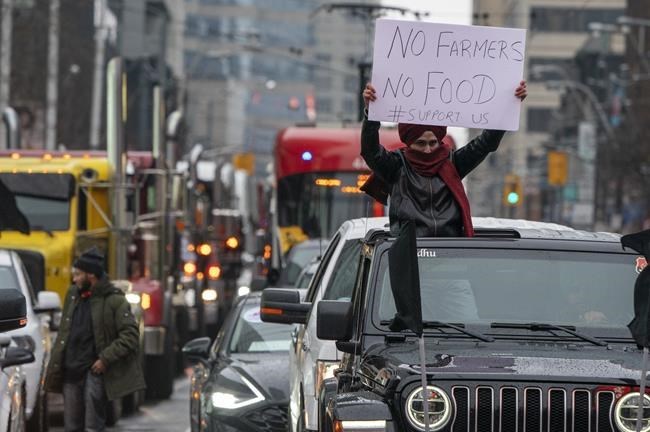
Demonstrators parade in trucks and dump trucks in support of farmers in India during a protest in Toronto Dec. 12, 2020. THE CANADIAN PRESS/Frank Gunn
January 29, 2021 - 11:20 AM
For several days, Karan Singh has been frantically checking the latest news from India where his father and other farmers have been demanding the government repeal new agriculture laws that open more space for private investors.
The 25-year-old from Sudbury, Ont., says concern for his father — who farms cotton, wheat and sugar cane in India's northern Punjab state — started in September. That's when Prime Minister Narendra Modi introduced three bills that farmers say will reshape agriculture in the region, and Singh's father and friends joined protests.
One of the bills allows farmers to forge deals with companies to produce a certain amount and to sell their crops directly to private buyers instead of to the Indian government at a regulated price.
Modi's government argues the new laws will bring growth. But smaller farmers like Singh's dad fear that the removal of state protections that they already consider insufficient will leave them at the mercy of greedy corporations.
Singh says his stress peaked two days ago when Modi's government shut down internet in parts of New Delhi where protesters were gathering. Singh lost touch with his father and friends for about two hours as they made their way to India's capital.
"It was really critical hours," Singh said about the wait while protesters on horses and tractors stormed India’s historic Red Fort. They broke through police barricades into the nearly 400-year-old landmark after weeks of peaceful sit-ins and rallies — a deeply symbolic act that revealed their determination in challenging Modi’s government.
"I didn't know where he was. I was worried and praying that hopefully those that I know will not be there in harm," Singh said.
"Then there was a news that there was a death of one of the farmers in the protest and I was sad and couldn't focus on work."
It turned out his father was a few kilometres away and was safe. He has since returned to his farm, away from the protests, Singh said.
Canadian Sikhs with family in India say they are worried about the brewing tension in the country during a global pandemic.
"Sikhs are a significant part of our communities and a lot of our volunteers have family in India. We have volunteers in India as well, who are working with the farmers," Jindi Singh, national director of the World Sikh Organization of Canada, said from his home in Victoria.
"What we've seen is that the police presence has increased exponentially, so there is increased concern about safety."
Since the protests began, videos have emerged of police hitting farmers with water cannons, releasing tear gas and beating them with batons. Negotiations between farmers and the Indian government have been in a deadlock.
In late November, Prime Minister Justin Trudeau spoke in support of Punjabi farmers and said his government had reached out to Indian authorities to highlight concerns.
Canadians must do more to pressure the federal government to continue doing that, said Jindi Singh.
"On a Friday night, if you're having butter chicken and basmati rice, if this morning you got up and you had a turmeric latte, if on the weekend you're going to cook and you're going to use Indian spices ... all of those items have come from an Indian farmer."
Sikhs across Canada have been holding weekly protests in solidarity with the farmers.
"The thing is, we physically are here in Canada, but emotionally we are still in those struggles because, as a son of a farmer, you can feel the pain," Karan Singh said.
"Agriculture is not a job that we do. Agriculture is also our culture. It's a part of who we are."
— With files from The Associated Press
This report by The Canadian Press was first published Jan. 29, 2021
———
This story was produced with the financial assistance of the Facebook and Canadian Press News Fellowship
Note to readers: This is a corrected story; a previous version attributed the last quote to Jindi Singh.
News from © The Canadian Press, 2021